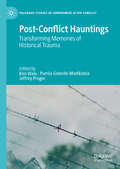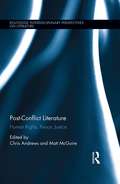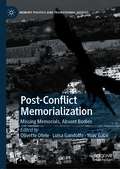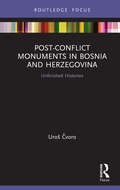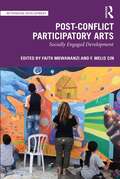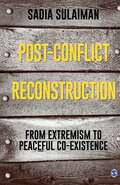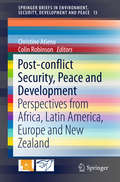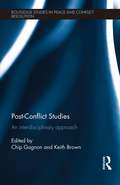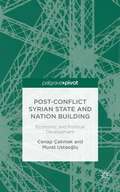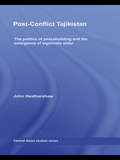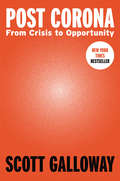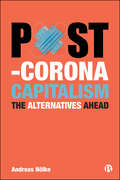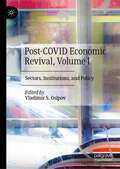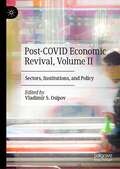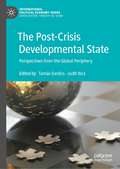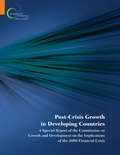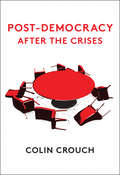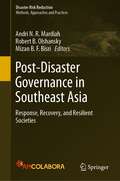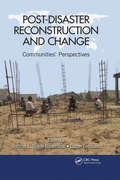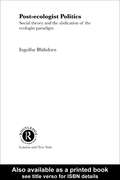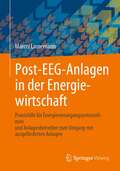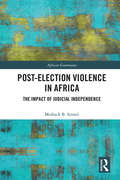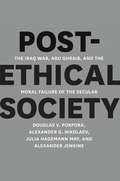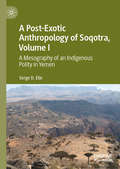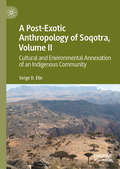- Table View
- List View
Post-Conflict Hauntings: Transforming Memories of Historical Trauma (Palgrave Studies in Compromise after Conflict)
by Pumla Gobodo-Madikizela Jeffrey Prager Kim WaleThis book engages the globally pressing question of how to live and work with the haunting power of the past in the aftermath of mass violence. It brings together a collection of interdisciplinary contributions to reflect on the haunting of post-conflict memory from the perspective of diverse country case studies including South Africa, Rwanda, Zimbabwe, Northern Ireland, North and South Korea, Palestine and Israel, America and Australia. Contributions offer theoretical, empirical and practical insights on the nature of historical trauma and practices of collective healing and repair that include embodied, artistic and culturally relevant forms of wisdom for dealing with the past. While this question has traditionally been explored through the lens of trauma studies in relation to the post-Holocaust experience, this book provides new understandings from a variety of different historical contexts and disciplinary perspectives. Its chapters draw on, challenge and expand the trauma concept to propose more contextually relevant frameworks for transforming haunted memory in the aftermath of historical trauma.
Post-Conflict Literature: Human Rights, Peace, Justice (Routledge Interdisciplinary Perspectives on Literature)
by Chris Andrews Matt McGuireThis book brings together a variety of perspectives to explore the role of literature in the aftermath of political conflict, studying the ways in which writers approach violent conflict and the equally important subject of peace. Essays put insights from Peace and Conflict Studies into dialog with the unique ways in which literature attempts to understand the past, and to reimagine both the present and the future, exploring concepts like truth and reconciliation, post-traumatic memory, historical reckoning, therapeutic storytelling, transitional justice, archival memory, and questions about victimhood and reparation. Drawing on a range of literary texts and addressing a variety of post-conflict societies, this volume charts and explores the ways in which literature attempts to depict and make sense of this new philosophical terrain. As such, it aims to offer a self-conscious examination of literature, and the discipline of literary studies, considering the ability of both to interrogate and explore the legacies of political and civil conflict around the world. The book focuses on the experience of post-Apartheid South Africa, post-Troubles Northern Ireland, and post-dictatorship Latin America. The recent history of these regions, and in particular their acute experience of ethno-religious and civil conflict, make them highly productive contexts in which to begin examining the role of literature in the aftermath of social trauma. Rather than a definitive account of the subject, the collection defines a new field for literary studies, and opens it up to scholars working in other regional and national contexts. To this end, the book includes essays on post-1989 Germany, post-9/11 United States, the Israeli-Palestinian conflict, Sierra Leone, and narratives of asylum seeker/refugee communities. This volume’s comparative frame draws on well-established precedents for thinking about the cultural politics of these regions, making it a valuable resource for scholars of Comparative Literature, Peace and Conflicts Studies, Human Rights, Transitional Justice, and the Politics of Literature.
Post-Conflict Memorialization: Missing Memorials, Absent Bodies (Memory Politics and Transitional Justice)
by Olivette Otele Luisa Gandolfo Yoav GalaiAs the world negotiates immense loss and questions of how to memorialize, the contributions in this volume evaluate the role of culture as a means to promote reconciliation, either between formerly warring parties, perpetrators and survivors, governments and communities, or within the self. Post-Conflict Memorialization: Missing Memorials, Absent Bodies reflects on a distinct aspect of mourning work: the possibility to move towards recovery, while in a period of grief, waiting, silence, or erasure. Drawing on ethnographic data and archival material from Bosnia-Herzegovina, Argentina, Palestine, Israel, Wales, Peru, Colombia, Hungary, Chile, Pakistan, and India, the authors analyze how memorialization and commemoration is practiced by communities who have experienced trauma and violence, while in the absence of memorials, mutual acknowledgement, and the bodies of the missing. This timely volume will appeal to undergraduate and postgraduate students, postdoctoral researchers, and scholars with an interest in memory studies, sociology, history, politics, conflict, and peace studies
Post-Conflict Monuments in Bosnia and Herzegovina: Unfinished Histories (Routledge Focus on Art History and Visual Studies)
by Uroš ČvoroAt a time of dramatic struggles over monuments around the world, this book examines monuments that have been erected in post-conflict Bosnia and Herzegovina (BiH) since 1996. Examining the historical precedents for the high rate of monumentbuilding, and its links to ongoing political instability and national animosity, this book identifies the culture of remembrance in BiH as symptomatic of a broader shift: a monumentalisation and privatisation of history. It provides an argument for how to account for the politics of contemporary nation-state formation, control of space, trauma and revisions of history in a region that has been subject to prolonged instability and crisis. This book will be of interest to scholars in contemporary art, museum studies, war and conflict studies, and European studies.
Post-Conflict Participatory Arts: Socially Engaged Development (Rethinking Development)
by Faith MkwananziThis book investigates the power of art to enhance human development and to initiate positive social change for individuals and societies recovering from conflict. Interventions aimed at reinforcing social justice and bringing communities together after conflict are often accused of being top-down, or failing to consider all groups and contexts within a society. The use of participatory arts can help to address these challenges by fostering community engagement, social cohesion, influencing public policy, and ultimately, advancing social justice. Arts-based methods can be particularly effective at reaching youth communities, providing voice and political agency to young people who are often not given a platform. Situated at the intersection of participatory arts, social and epistemic justice, this book brings together case studies from across the world to reflect on best practice for the use of bottom-up, participatory, co-produced, and co-designed arts processes in conflict settings. This book provides an important guide to the role that arts can play in addressing epistemic injustice and contributing to social justice and human development. As such, it will be of interest to international development and arts practitioners, policy makers, and to students and researchers across participatory arts, youth studies, international development, social justice, and peace and conflict studies.
Post-Conflict Reconstruction: From Extremism to Peaceful Co-Existence
by Sadia SulaimanPost-Conflict Reconstruction: From Extremism to Peaceful Co-Existence is a comprehensive presentation on the root causes of state fragility, which provides an enabling environment for violent religious extremism. It addresses various security, political, socio-economic and external factors that contribute to state fragility, which is further enhanced in a conflict environment. The book deals closely with the use of violence due to ideological, religious and political reasons. By analyzing the situations in the post-conflict states of Afghanistan, Iraq, Yemen, Pakistan, Nigeria and Libya, the book establishes the co-relationship between state fragility and religious extremism in post-conflict settings. The book emphasizes the need to address the grievances of marginalized sections in all countries with fragile state structures that usually take to violence to make their voices heard. It also highlights the imperative for swift rehabilitation of poor people—who typically bear the brunt of conflicts and are often displaced forcefully—for restoring peace and security, and averting future disturbance.
Post-conflict Security, Peace and Development: Perspectives From Africa, Latin America, Europe And New Zealand (Springerbriefs In Environment, Security, Development And Peace Ser. #13)
by Christine Atieno Colin RobinsonThis book examines links between post-conflict security, peace and development in Africa, Latin America, Europe and New Zealand. Young peace researchers from the Global South (Uganda, Ivory Coast, Kenya, Brazil, Colombia) as well as from Italy and New Zealand address in case studies traumas in Northern Uganda, demobilisation and reintegration of ex-combatants in the Ivory Coast, economic and financial management of terrorism in Kenya, organised crime in Brazil, mental health issues in Colombia, macro realism in Europe and global defence reforms within the military apparatus since 1990. The book reviews linkages between regional stability, development and peace in post-conflict societies while adding on to the post 2015 international agenda and discusses linkages between peace, security and development.
Post-Conflict Studies: An Interdisciplinary Approach (Routledge Studies in Peace and Conflict Resolution)
by Chip Gagnon Keith BrownThis book examines how the violence of conflict is transformed in the post-conflict period. Post-conflict studies seek to illuminate, theorise, and narrate the processes by which societies transition from periods of overt and violent conflict to periods of relative stability and peace. Most of the research carried out on post-conflict societies has taken place within disciplinary bounds. In contrast, this volume breaches those boundaries; though each author is grounded in a particular discipline, the chapters have been written in a spirit of interdisciplinarity. The focus of the volume is how the violence of conflict is transformed in the post-conflict period into processes that the editors have categorised as criminalisation, medicalisation and missionisation. Comprised of essays written by a diverse group of scholars and activists from anthropology, political science, international relations, law, education, religion, and military history, each section of the book looks at the concept of post-conflict in a way that problematises its common usage and highlights the importance of strongly interdisciplinary research into post-conflict societies. This book will be of interest to students of war and conflict studies, peace studies, security studies and IR in general.
Post-Conflict Syrian State and Nation Building: Economic and Political Development
by Cenap Çakmak Murat UstaoğluBased on extensive field work involving the leading figures of the diverse Syrian National Coalition, an umbrella initiative of opposition groups fighting against the Assad regime, this study critically evaluates the challenges ahead as well as the inherent opportunities for the post-conflict era in Syria.
Post-Conflict Tajikistan: The politics of peacebuilding and the emergence of legitimate order (Central Asian Studies #Vol. 16)
by John HeathershawPost-Soviet, post-conflict Tajikistan is an under-studied and poorly understood case in conflict studies literature. Since 2000, this Central Asian state has seen major political violence end, countrywide order emerge and the peace agreement between the parties of the 1990s civil war hold. Superficially, Tajikistan appears to be a case of successful international intervention for liberal peacebuilding, yet the Tajik peace is characterised by authoritarian governance. Via discourse analysis and extensive fieldwork, including participant-observation with international organizations, the author examines how peacebuilding is understood and practised. The book challenges received wisdom that peacebuilding is a process of democratisation or institutionalisation, showing how interventions have inadvertently served to facilitate an increasingly authoritarian peace and fostered popular accommodation and avoidance strategies. Chapters investigate assistance to political parties and elections, the security sector and community development, and illustrate how transformative aims are thwarted whilst ‘success’ is simulated for an audience of international donors. At the same time the book charts the emergence of a legitimate order with properties of authority, sovereignty and livelihoods. Providing a challenge to the theoretical literature on peacebuilding and concentrating on an under-studied Central Asian state, this book will be of interest to academics working on Peace Studies, International Relations and Central Asian Studies.
Post Corona: From Crisis to Opportunity
by Scott Galloway"This is as good an analysis as you could wish to read." --The Financial TimesFrom bestselling author and NYU Business School professor Scott Galloway comes a keenly insightful, urgent analysis of who stands to win and who's at risk to lose in a post-pandemic worldThe COVID-19 outbreak has turned bedrooms into offices, pitted young against old, and widened the gaps between rich and poor, red and blue, the mask wearers and the mask haters. Some businesses--like home exercise company Peloton, video conference software maker Zoom, and Amazon--woke up to find themselves crushed under an avalanche of consumer demand. Others--like the restaurant, travel, hospitality, and live entertainment industries--scrambled to escape obliteration.But as New York Times bestselling author Scott Galloway argues, the pandemic has not been a change agent so much as an accelerant of trends already well underway. In Post Corona, he outlines the contours of the crisis and the opportunities that lie ahead. Some businesses, like the powerful tech monopolies, will thrive as a result of the disruption. Other industries, like higher education, will struggle to maintain a value proposition that no longer makes sense when we can't stand shoulder to shoulder. And the pandemic has accelerated deeper trends in government and society, exposing a widening gap between our vision of America as a land of opportunity, and the troubling realities of our declining wellbeing.Combining his signature humor and brash style with sharp business insights and the occasional dose of righteous anger, Galloway offers both warning and hope in equal measure. As he writes, "Our commonwealth didn't just happen, it was shaped. We chose this path--no trend is permanent and can't be made worse or corrected."
Post-Corona Capitalism: The Alternatives Ahead
by Andreas NölkeThe COVID-19 pandemic is a Rorschach test for society: everyone sees something different in it, and the range of political and economic responses to the crisis can leave us feeling overwhelmed. This book cuts through the confusion, dissecting the new post-coronavirus capitalism into several policy areas and spheres of action to inform academic, policy and public discourse. Covering all the major aspects of contemporary capitalism that have been affected by the pandemic, Andreas Nölke deftly analyses the impacts of the crisis on our socio-economic and political systems. Signposting a new era for global capitalism, he offers alternatives for future economic development in the wake of COVID-19.
Post-COVID Economic Revival, Volume I: Sectors, Institutions, and Policy
by Vladimir S. OsipovThis two-volume book examines the most important global problem—the recovery of the social-economic crises due to the COVID-19 pandemic. This economic crisis has its own basis and differs from others by the lockdown of most businesses on the decision of authorities. The uncertainty of the future economic revival obliges scientists around the world to unite in search of effective solutions that will become the basis for prosperity and human wellbeing.The death of millions of people around the world, several waves of coronavirus, and a global pandemic have forced most states to seek extraordinary measures to save people and revive economic activity. The world economy experienced a global shock, probably never experienced before due to lockdowns. The disruptions and gaps in the value chains were primarily caused by the lockdowns of enterprises. The change in the essence of the economic crisis has raised the question of how to overcome it and revive economic activity. The crisis caused a sharp decline in incomes of the population around the world, which led to social upheavals. Post-COVID economic revival in a globalized world has become the most important problem of our time. This book offers contributions of authors from different countries and explores problem solving in the fields of public administration (Volume I, Part I), financial services (Volume I, Part II), different branches (Volume II, Part III) and the social sector (Volume II, Part IV).The first volume discusses governmentality, public, and corporate management. The second part of the volume reveals the trends in the development of the financial sector in the post-COVID period. Despite the fact that the book is divided into two volumes and four parts, a holistic and systematic perception of the new reality of the post-COVID age can be obtained by reading the entire book. This book will be of interest to academics and practitioners in public administration and economics, particularly those who are interested in Post-COVID economic revival.
Post-COVID Economic Revival, Volume II: Sectors, Institutions, and Policy
by Vladimir S. OsipovThis two-volume book examines the most important global problem—the recovery of the social-economic crises due to the COVID-19 pandemic. This economic crisis has its own basis and differs from others by the lockdown of most businesses on the decision of authorities. The uncertainty of the future economic revival obliges scientists around the world to unite in search of effective solutions that will become the basis for prosperity and human wellbeing. The death of millions of people around the world, several waves of coronavirus, and a global pandemic have forced most states to seek extraordinary measures to save people and revive economic activity. The world economy experienced a global shock, probably never experienced before due to lockdowns. The disruptions and gaps in the value chains were primarily caused by the lockdowns of enterprises. The change in the essence of the economic crisis has raised the question of how to overcome it and revive economic activity. The crisis caused a sharp decline in incomes of the population around the world, which led to social upheavals. Post-COVID economic revival in a globalized world has become the most important problem of our time. This book offers contributions of authors from different countries and explores problem solving in the fields of public administration (Volume I, Part I), financial services (Volume I, Part II), different branches (Volume II, Part III) and the social sector (Volume II, Part IV). The second volume of the book is devoted problems in sectors of the economy, such as agriculture, tourism, aircraft, the automotive industry, electricity, culture, etc. The second part of the second volume examines trends in the revival in the social sector—medicine, pharmaceuticals, the labor market and social insurance. Despite the fact that the book is divided into two volumes and four parts, a holistic and systematic perception of the new reality of the post-COVID age can be obtained by reading the entire book. This book will be of interest to academics and practitioners in public administration and economics, particularly those who are interested in Post-COVID economic revival.
The Post-Crisis Developmental State: Perspectives from the Global Periphery (International Political Economy Series)
by Tamás Gerőcs Judit RiczThe focus of this volume is on the role of the developmental state in a situation in which a series of major crises affects the (semi-) periphery of the global economy. The authors go beyond the established debate on developmental states in East Asia by highlighting a much broader understanding of development and a very different global economic context. They also further the existing debate by covering new country cases. At the same time, they deepen our perspective on developmental states by looking at unusual sectors such as green industrial policy, education and farming.
Post-Crisis Growth in Developing Countries
by Commission on Growth and DevelopmentThe 2008 financial crisis has raised a number of questions about the best strategy for achieving sustained growth and poverty reduction in developing countries, foremost among them whether the failure of the financial system also signifies the broader failure of market-oriented capitalist systems. The Growth Commission believes that the crisis was not a failure of market-oriented systems and that an outward-looking strategy, as suggested in the original Growth Report (published in May 2008), remains broadly valid. The following questions are discussed in this special report: - How has the economic landscape changed in the wake of the financial crisis of 2008? - What factors contributed to the onset of the financial crisis and its transmission from advanced to developing countries? - Should the crisis be interpreted as a failure of financial-sector regulation or as a broader failure of market-based systems? - What effects will the financial crisis have on the prospects for economic growth in developing countries? - How will the crisis impact the formulation of developing country growth strategies going forward? - What is the outlook for free trade and a growth model that capitalizes on the global economy? - How do actions by the advanced economies in response to the crisis affect the choices of policy makers in the developing world? - What is the appropriate role of government in the post-crisis economy? - How will the lessons of the crisis affect strategies for financial-sector development in developing countries? - What are the prospects for improved international oversight of global finance and cross-border financial flows?
Post-Democracy After the Crises
by Colin CrouchIn Post-Democracy (Polity, 2004) Colin Crouch argued that behind the façade of strong institutions, democracy in many advanced societies was being hollowed out, its big events becoming empty rituals as power passed increasingly to circles of wealthy business elites and an ever-more isolated political class.Crouch’s provocative argument has in many ways been vindicated by recent events, but these have also highlighted some weaknesses of the original thesis and shown that the situation today is even worse. The global financial deregulation that was the jewel in the crown of wealthy elite lobbying brought us the financial crisis and helped stimulate xenophobic movements which no longer accept the priority of institutions that safeguard democracy, like the rule of law. The rise of social media has enabled a handful of very rich individuals and institutions to target vast numbers of messages at citizens, giving a false impression of debate that is really stage-managed from a small number of concealed sources. Crouch evaluates the implications of these and other developments for his original thesis, arguing that while much of his thesis remains sound, he had under-estimated the value of institutions which are vital to the support of a democratic order. He also confronts the challenge of populists who seem to echo the complaints of Post-Democracy but whose pessimistic nostalgia brings an anti-democratic brew of hatred, exclusion and violence.
Post-Disaster Governance in Southeast Asia: Response, Recovery, and Resilient Societies (Disaster Risk Reduction)
by Andri N. R. Mardiah Robert B. Olshansky Mizan B. F. BisriThis book aims to provide insight into how Southeast Asian countries have responded to disasters, recovered, and rebuilt. It investigates emergency response and disaster recovery cases at national levels and from regional perspectives. Recovery from great disasters poses great challenges to affected countries in terms of organization, financing, and opportunities for post-disaster betterment. Importantly, disasters are critical moments in which to achieve disaster risk reduction, especially in the context of climate change and Sustainable Development Goals. Insights from these cases can help other countries better prepare for response and recovery before the next disaster strikes. While the experiences of disaster risk reduction and climate change implementation in Southeast Asian countries have been well documented, tacit knowledge from emergency response and recovery from these countries has not been transformed into explicit knowledge. There are only a few books that integrate information and lessons from post-disaster governance in Southeast Asia as a region, and because of the importance of providing real and recent situations, this book will interest many policymakers, practitioners, and academics. The information presented here will lead to a better understanding of how to plan for future disasters and improve governance to ensure effective emergency response as well as encouraging a build back better and safer towards a more resilient and sustained recovery.
Post-Disaster Reconstruction and Change: Communities' Perspectives
by Jennifer E. Duyne Barenstein Esther LeemannSuccessful recovery following a disaster depends upon transcending the disciplinary divides of architecture, engineering, and planning and emphasizing the importance of community perspectives in the post-disaster reconstruction process. Effective results in community recovery mandate that we holistically examine the complex interrelationship betwee
Post-Ecologist Politics: Social Theory and the Abdication of the Ecologist Paradigm (Routledge Innovations in Political Theory)
by Ingolfur BlühdornSince the late 1980s, ecological thought and the European eco-movement have gone through a phase of fundamental transformation which has been widely acknowledged but not yet theorised in any satisfactory way. This important text questions why radical ecological criticism has had so little impact on contemporary society, despite the urgency of the issues it highlights. The book offers a challenging theoretical critique of ecological thought itself.
Post-EEG-Anlagen in der Energiewirtschaft: Praxishilfe für Energieversorgungsunternehmen und Anlagenbetreiber zum Umgang mit ausgeförderten Anlagen
by Marcel LinnemannBetreiber von Anlagen, die unter das EEG fallen, werden vor der Frage stehen, wie der weitere Betrieb sicherzustellen ist. Dieses Buch zeigt die Möglichkeiten zur Vermarktung solcher Anlagen für Energieversorger und Anlagenbetreiber auf, bespricht die Hintergründe sowie die Vertragsgestaltung. Messkonzepte für unterschiedliche Vermarktungskonzepte (Volleinspeisung, Überschusseinspeisung) sowie die regulatorische Einordung (Steuern, EEG Umlage ect.) sind ebenso berücksichtigt.
Post-Election Violence in Africa: The Impact of Judicial Independence (African Governance)
by Meshack SimatiThis book explores the effect of the judiciary on the incidence of post-election violence by political actors across Africa and within African countries. It examines how variation in judicial independence can constrain or incentivize election violence among democratizing states. Using case studies and cross-national analysis, the book shows that variation in levels of judicial independence from a non-independent judiciary to a quasi-independent judiciary or from a fully independent judiciary to quasi-independent judiciary increases the likelihood of strategic use of post-election violence by non-state actors. However, the likelihood of post-election violence is significantly reduced in non-independent judiciaries or once countries’ judiciaries become fully independent. The author makes the theoretical argument that, within unconsolidated states, non-state actors that view the judiciary as semi-independent are more likely to engage in post-election violence with the purpose of creating political and professional uncertainty in order to influence assertive behaviour from judges in disputed elections. Consequently, the book argues that semi-independent judiciaries or judiciaries that are neither fully controlled by the incumbent nor fully independent from the incumbent can help explain post-election violence among unconsolidated states, all else being equal. This book will be of interest to scholars of election violence, democratic politics, law and politics and African politics.
Post-Ethical Society: The Iraq War, Abu Ghraib, and the Moral Failure of the Secular
by Douglas V. Porpora Alexander Nikolaev Julia Hagemann May Alexander JenkinsWeve all seen the images from Abu Ghraib: stress positions, US soldiers kneeling on the heads of prisoners, and dehumanizing pyramids formed from black-hooded bodies. We have watched officials elected to our highest offices defend enhanced interrogation in terms of efficacy and justify drone strikes in terms of retribution and deterrence. But the mainstream secular media rarely addresses the morality of these choices, leaving us to ask individually: Is this right? In this singular examination of the American discourse over war and torture, Douglas V. Porpora, Alexander Nikolaev, Julia Hagemann May, and Alexander Jenkins investigate the opinion pages of American newspapers, television commentary, and online discussion groups to offer the first empirical study of the national conversation about the 2003 invasion of Iraq and the revelations of prisoner abuse at Abu Ghraib a year later. "Post-Ethical Society" is not just another shot fired in the ongoing culture war between conservatives and liberals, but a pensive and ethically engaged reflection of Americas feelings about itself and our actions as a nation. And while many writers and commentators have opined about our moral place in the world, the vast amount of empirical data amassed in "Post-Ethical Society "sets it apart--and makes its findings that much more damning.
A Post-Exotic Anthropology of Soqotra, Volume I: A Mesography of an Indigenous Polity in Yemen
by Serge D. ElieThis two-volume book offers a panoramic explanatory narrative of Soqotra Island’s rediscovery based on the global significance of its endemic biodiversity. This rediscovery not only engendered Soqotra’s protective environmental supervision by United Nations agencies, but also the intensification of its bureaucratic incorporation and political subordination by Yemen’s mainland national government. Together, the two volumes provide a “total” community study based on an historically contextualized and analytically detailed portrait of the Soqotran community via a multi-layered narrative the author terms a “mesography.” The first volume, A Post-Exotic Anthropology of Soqotra, Volume I: A Mesography of an Indigenous Polity in Yemen, situates the author’s study within the emergent configuration of the structures of knowledge production in the social sciences before moving onto a systematic identification of the constitutive aspects, pivotal vectors, and historical contexts of Soqotra’s transitioning polity. The second volume, A Post-Exotic Anthropology of Soqotra, Volume II: Cultural and Environmental Annexation of an Indigenous Community, explores how cultural modernization in the light of environmental annexation transforms communal possibilities, development models, environmental values, conservation priorities, cultural practices, economic aspirations, language preferences, livelihood choices, and other key social norms. The two volumes lay the social scientific foundations for the study of Soqotrans as an island-based indigenous community.
A Post-Exotic Anthropology of Soqotra, Volume II: Cultural and Environmental Annexation of an Indigenous Community
by Serge D. ElieThis two-volume book offers a panoramic explanatory narrative of Soqotra Island’s rediscovery based on the global significance of its endemic biodiversity. The first volume, A Post-Exotic Anthropology of Soqotra: A Mesography of an Indigenous Polity in Yemen initiated the analytical inventory of the four key vectors of Soqotra’s transition process through a discussion of the first two: economic disarticulation and political incorporation. This volume, A Post-Exotic Anthropology of Soqotra: Cultural & Environmental Annexation of an Indigenous Community completes the analytical inventory by exploring the other two pivotal vectors of transition: cultural modernization and environmental annexation. These two vectors encompass the critical sociocultural spheres and environmental domains in which Soqotra’s transformation process is unfolding. The origin of these vectors is situated within Soqotra’s long history of exogenous mediations by external actors and their symbolic appropriation of the island into an imaginative geography. The legacy is a “symbolic curse," which has made Soqotra into an ideal playground for fantasist cultural or environmental experiments. Accordingly, this volume undertakes, first, a systematic inventory of the communal effects engendered within the domains of cultural modernization: dissonant linguistic attitudes, alienating consumption practices, divergent religious affiliations, and differentiating economic aspirations. Second, it anatomizes the process of environmental annexation through the reconstruction of the formulation and implementation process of a biodiversity conservation and sustainable development experiment in which the island and its residents are appropriated into an anachronistic paradigm – a pastoral ecotopia – as a blueprint of their future.
